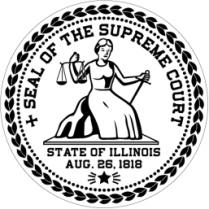Quick Take on Illinois Supreme Court Opinion Issued Thursday, July 20
 Kerry Bryson reviews People v. Holmes, handed down Thursday, July 20.
Kerry Bryson reviews People v. Holmes, handed down Thursday, July 20.
By Kerry Bryson, Office of the State Appellate Defender
Prior to the Illinois Supreme Court’s issuing its decision in Aguilar, David Holmes was arrested at a Chicago beach when officers observed a revolver sticking out of his waistband. After his arrest, the police learned that he did not have a FOID card. He was charged with two counts of AUUW for carrying an uncased, loaded, and immediately accessible firearm and two counts of AUUW for carrying a firearm without a valid FOID card.
Those first two counts were nolle prossed by the state after Aguilar was decided. Prosecution of the no-FOID counts continued.
Holmes filed a motion to suppress arguing that the police lacked probable cause to believe he was committing a crime because the AUUW statute upon which his arrest was based was later held unconstitutional and thus was void ab initio (or, as if it had never existed). Holmes further argued that the good faith exception to the exclusionary rule did not apply where the police were enforcing an unconstitutional statute. The trial court allowed the motion to suppress, noting that it was “unfortunate” because the officer’s actions were not improper at the time. The appellate court affirmed, concluding that the void ab initio doctrine precluded application of the good faith exception.
In the supreme court, the state argued that the void ab initio doctrine did not retroactively invalidate Holmes’s arrest based upon a then-valid criminal statute and, alternatively, if it did, then the good faith exception should apply.
The court began its analysis by examining its opinion in People v. Carrera, 203 Ill. 2d 1 (2002). There, the defendant was arrested pursuant to a statute granting extraterritorial arrest powers, which was later held unconstitutional and thus void ab initio because it was enacted in violation of the single subject rule. The court declined to apply the good faith exception in Carrera, reasoning that it would effectively provide a “grace period” for the unconstitutionally enacted statute.
Here, the court distinguished Carrera because that statute’s unconstitutionality was based purely on state grounds (violating the state constitution’s single-subject clause), so applying this state’s void ab initio doctrine was appropriate. On the other hand, the AUUW statute’s unconstitutionality was based on the Second Amendment to the United States Constitution. Also, probable cause was not at issue in Carrera, as it was in the instant matter. Further, the issues in Carrera did not implicate the limited lockstep doctrine because the single-subject rule does not have a parallel in the federal constitution.
The court then went on to apply the limited lockstep doctrine. Under federal case law, probable cause in this case would not be retroactively invalidated by the statute’s being later held unconstitutional, thus application of the void ab initio doctrine would conflict with limited lockstep. The court specifically held “that the void ab initio doctrine does not retroactively invalidate probable cause based on a statute later held unconstitutional on federal constitutional grounds or on state constitutional grounds subject to the limited lockstep doctrine.”
Because the void ab initio doctrine did not retroactively invalidate probable cause, the court did not reach any issue with regard to application of the good-faith exception.
In a dissenting opinion, Justice Kilbride concluded that the majority’s opinion “brings the demise of this court’s void ab initio doctrine one step closer.” He noted that the opinion undermines the protections provided to Illinois citizens by the void ab initio doctrine, the purpose of which are: preservation of constitutional rights, providing a full remedy for all legislative violations, and discouraging future enactment of unconstitutional legislation. Justice Kilbride criticized the majority’s opinion as allowing the sort of legislative “grace period” which the court had previously sought to avoid.

